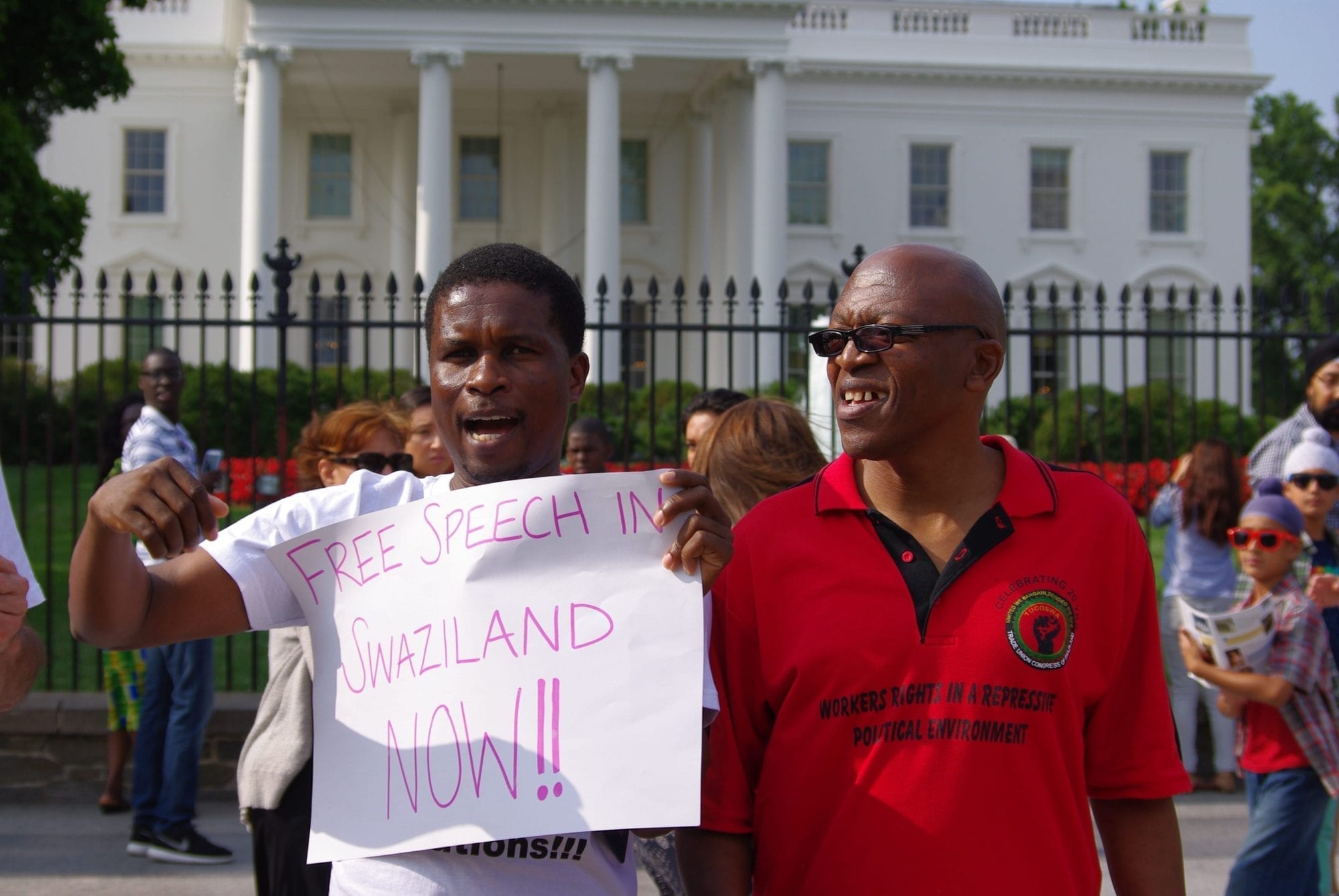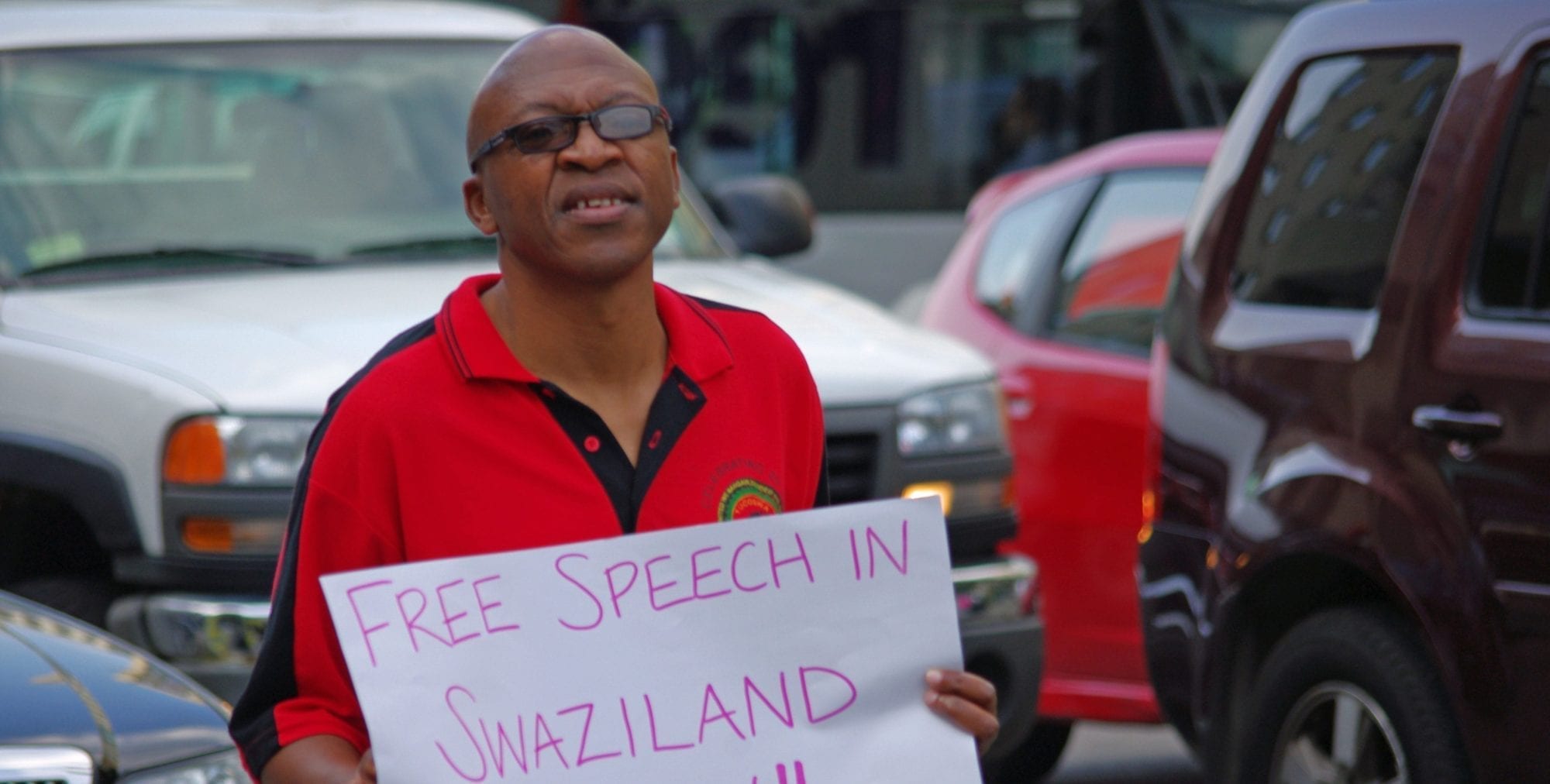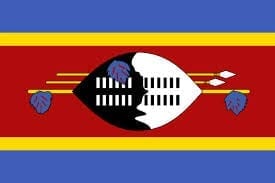Mar 27, 2015
“In June 2014 the U.S. government took the rare step of suspending African Growth and Opportunity Act (AGOA) trade benefits for Swaziland, citing the Swazi government’s systematic violations of fundamental worker rights, including refusal to legally recognize TUCOSWA,” reported the Solidarity Center.

Mar 16, 2015
For the second time in two weeks, police have broken up a union meeting of the Trade Union Congress of Swaziland (TUCOSWA), this time physically injuring a union leader who was taking part.
According to the Swazi Observer and TUCOSWA leaders, more than 300 plain-clothed police forced participants to end a union executive board meeting in the Swaziland National Association of Teachers (SNAT) Center on Saturday and blocked the gates to the building. Muzi Mhlanga, SNAT secretary general, was assaulted and had to seek medical care, according to TUCOSWA.
“The police came in as if they were coming to fight an army,” said TUCOSWA Secretary General Vincent Ncongwane.
“They actually manhandled us, stopping anyone coming in or going out of the venue,” Ncongwane said in a letter to the Minister of Labor and other government officials to make them aware of the events and seek redress.
“We were squashed between various policemen who were trying to read the emails we were sending (to international labor allies). Police also demanded their phones because union leaders were taking photos of the police “without their permission. They said their orders are to crush any TUCOSWA meeting.”
Swaziland police also broke up a national union meeting February 28, on the grounds that workers were discussing democracy.
Over the past three years, Swaziland authorities have refused to grant legal registration to TUCOSWA, most recently denying the federation’s December 2014 application under the country’s recently amended Industrial Relations Act. In August 2014, some in the Swazi government falsely accused Ncongwane and human rights lawyer Sipho Gumedze of taking a stand against trade benefits for Swaziland when they were in Washington, D.C., to attend the U.S. Africa Leaders Summit Civil Society Forum.
TUCOSWA is receiving key support from the country’s religious leaders. On Sunday, a coalition of Christian churches called for the registration and recognition of TUCOSWA as part of its broader call for multiparty democracy to address the Swaziland’s political, social and economic crises.
In June 2014 the U.S. government took the rare step of suspending African Growth and Opportunity Act (AGOA) trade benefits for Swaziland, citing the Swazi government’s systematic violations of fundamental worker rights, including refusal to legally recognize TUCOSWA. Swaziland’s trade unions support AGOA, but maintain that the country must meet benchmarks of the agreement, which include respecting human rights and labor rights.
The 2014 U.S. State Department human rights report cited serious human rights violations in Swaziland, including arbitrary or unlawful killings by the government or its agents; severely restricted freedom of assembly, including violence against protestors; jailing of trade union leaders; the deregistration of TUCOSWA and the banning of strikes.

Mar 3, 2015
Accusing workers of discussing democracy, Swazi police broke up a national union meeting over the weekend in Manzini, according to Trade Union Congress of Swaziland (TUCOSWA) Secretary-General Vincent Ncongwane.
“The police said they would crush our meeting if we do not remove any discussion on multiparty democracy because according to the police, and their supervisors, that is not a workers’ agenda,” Ncongwane told Radio France Internationale. “And we said we are not going to remove that.”
Ncongwane said more than 100 police were at the site, and they erected roadblocks to prevent TUCOSWA members from entering the building. When union leaders cited the country’s constitution as allowing freedom of assembly, the police “said to us we are not going to be bothered about us quoting sections of the law,” Ncongwane recounted. “They are going to be interested in applying their discretion.”
The police action is the latest move against worker and human rights in Swaziland. Swaziland authorities continue their nearly three-year refusal to grant legal registration to TUCOSWA, despite the federation making another application in December 2014 under the country’s recently amended Industrial Relations Act. In August 2014, some in the Swazi government falsely accused Ncongwane and human rights lawyer Sipho Gumedze of taking a stand against trade benefits for Swaziland when they were in Washington, D.C., to attend the U.S. Africa Leaders Summit Civil Society Forum.
Earlier in June 2014 the U.S. took the rare step of suspending African Growth and Opportunity Act (AGOA) trade benefits for Swaziland, citing the Swazi government’s systematic violations of fundamental worker rights, including refusal to legally recognize TUCOSWA. Swaziland’s trade unions support AGOA, but maintain that the country must meet benchmarks of the agreement, which include respecting human rights and labor rights.
The 2014 U.S. State Department human rights report cited serious human rights violations in Swaziland, including arbitrary or unlawful killings by the government or its agents; severely restricted freedom of assembly, including violence against protestors; jailing of trade union leaders; the deregistration of TUCOSWA and the banning of strikes.
AGOA had been on the union’s meeting agenda. Garment workers, 90 percent of whom are women, have been especially hard hit. Ncongwane noted that the loss of AGOA has cost many jobs, with 2,000 garment workers already laid off. “We think that there’s going to be a flood of workers that are going to lose jobs just because of the loss of AGOA.”
In addition to non-registration of TUCOSWA and AGOA, trade union leaders also had planned to discuss the increasing casualization of labor, in which more and more workers getting hired on three month-contracts that provide no job stability or living wages. Ncongwane said these issues will be on the agenda for the union’s next meeting, March 14, a date that coincides with the TUCOSWA’s creation in 2012.

Oct 9, 2014
Swaziland has ordered all worker and employer federations to stop operations immediately, a demand issued yesterday in a resolution by the government cabinet. The order effectively disbands the Trade Union Confederation of Swaziland (TUCOSWA), a Solidarity Center ally.
Minister of Labor and Social Security Winnie Magagula, quoted in the Times of Swaziland, said that in the wake of the resolution, “all federations are non- existent in terms of the Industrial Relations Act and should stop operating immediately until the amendment of the Industrial Relations Act has been passed by Parliament.”
The move runs counter to international labor standards, including the right of freedom of association.
“This is a blatant and outrageous attack on the ability of working people to form associations of their choice and stand up for their rights,” said Solidarity Center Executive Director Shawna Bader-Blau. “By denying workers a voice at work, the Swazi government is preventing workers from achieving safe and healthy workplaces and wages that will support themselves and their families.”
A recent TUCOSWA survey of more than 400 textile workers in Manzini, Swaziland, found that workers in the textile sector are subject to harsh and sometimes abusive conditions, many of the country’s labor laws are routinely violated by employers, and union activists are targeted by employers for punishment.
In June, the U.S. government took the rare step of suspending African Growth and Opportunity Act (AGOA) trade benefits for Swaziland, citing the Swazi government’s systematic violations of fundamental worker rights, including lack of ability for unions to register.
Magagula was quoted as citing the International Labor Organization (ILO) as directing the move, a charge the ILO unequivocally denies.
Condemning the action, AFL-CIO International Director Cathy Feingold wrote in a letter to Swazi Prime Minister Sibusiso Dlamini that it “is the latest in a series of actions designed to repress and restrict legitimate trade union activities in Swaziland.”
Sharan Burrow, International Trade Union Confederation (ITUC) general secretary, said, “We demand that the ruling be rescinded immediately.” The ITUC also sent a letter to the Swazi prime minister, condeming the move.
In August, some in the Swazi government falsely accused TUCOSWA General Secretary Vincent Ncongwane and human rights lawyer Sipho Gumedze of taking a stand against AGOA benefits for Swaziland when they were in Washington, D.C., as part of a delegation of 40 African trade union leaders.
The 2014 U.S. State Department human rights report cites serious human rights violations in Swaziland, including arbitrary or unlawful killings by the government or its agents; severely restricted freedom of assembly, including violence against protestors; jailing of trade union leaders; the deregistration of TUCOSWA and the banning of strikes.

Sep 24, 2014
Workers continue to be sickened at a Swazi textile factory where dozens of workers required hospitalization earlier this month after the plant began using the dangerous chemical butyl acetate to clean clothing stains. The workers, who went to the hospital at their own expense, reported chest pains, severe headaches, vomiting and bleeding, and some collapsed.
Despite the severity of the symptoms and the number of workers affected, the union says management ordered workers back on the job before a thorough health investigation was completed. The company has denied paid sick leave to workers, including one woman who developed bloody blisters in her mouth. Union shop stewards report that the dangerous working conditions have not been addressed and workers continue to become sick, with some vomiting blood. A pregnant worker who experienced swelling was told by doctors in intensive care that her baby may not be breathing.
Butyl acetate, a flammable liquid which targets the central nervous system, should not come in contact with eyes or skin because it causes headaches, skin and eye irritation, affects the upper respiratory system and can cause unconsciousness, according to the U.S. Centers for Disease Control and Prevention.
Shop stewards from the Trade Union Confederation of Swaziland (TUCOSWA), which represents the workers, met with Ministry of Labor officials and managers at the Tex-Ray plant after the initial incident. They requested that all the employees receive medical checkups but say the company provided only a few doctors at the site and assured government officials that a health and safety committee operated in the plant, although one was not created until after workers became ill.
The company has minimized the severity and extent of the illnesses, TUCOSWA leaders say, by reporting fewer incidents of illness to the government and insisting that some workers are ill from other causes. To make up for lost production at the plant, union leaders say the company is forcing workers to toil on day and night shifts. Some 1,600 textile workers produce fleece jackets, knit tops and pants, and children’s clothes at the plant, one of nine garment and fabric factories the company runs in Swaziland.
The plant is based in Matsapha, where most of the country’s industrial factories, primarily textile production, are centered. Workers responding to a recent TUCOSWA survey among 400 textile workers in Manzini, near Matsapha, report they work in harsh and sometimes abusive conditions and say labor laws are routinely violated.
In June, the United States suspended trade benefits to Swaziland, citing the country’s serious worker and human rights violations.The benefits, known as the African Growth and Opportunity Act (AGOA), provide key economic support for countries such as Swaziland.



